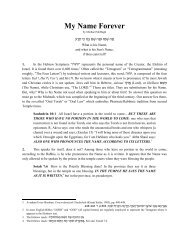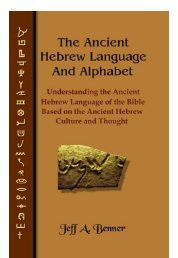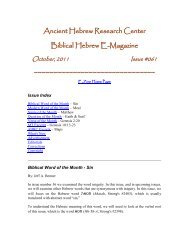Dating the Book of Job (PDF) - Ancient Hebrew Research Center
Dating the Book of Job (PDF) - Ancient Hebrew Research Center
Dating the Book of Job (PDF) - Ancient Hebrew Research Center
Create successful ePaper yourself
Turn your PDF publications into a flip-book with our unique Google optimized e-Paper software.
<strong>Dating</strong> <strong>the</strong> <strong>Book</strong> <strong>of</strong> <strong>Job</strong> 31<br />
Paul may also be making a vague reference to I Enoch when he speaks <strong>of</strong> an “aroma <strong>of</strong> life”;<br />
paralleling it with <strong>the</strong> knowledge <strong>of</strong> Christ.<br />
– To <strong>the</strong> one we are <strong>the</strong> aroma <strong>of</strong> death leading to death, and to <strong>the</strong> o<strong>the</strong>r <strong>the</strong> aroma <strong>of</strong> life leading to life. And<br />
who is sufficient for <strong>the</strong>se things? (II Corinthians 2:16 NKJV)<br />
The most ancient references to I Enoch can be found in <strong>the</strong> book <strong>of</strong> <strong>Job</strong> – <strong>the</strong> oldest book <strong>of</strong> <strong>the</strong><br />
Bible. One example is when Bildad speaks <strong>of</strong> <strong>the</strong> stars not being pure in םיהלֹ ִ א’s ֱ sight.<br />
– Then Bildad <strong>the</strong> Shuhite answered and said: “Dominion and fear belong to Him; He makes peace in His high<br />
places. Is <strong>the</strong>re any number to His armies? Upon whom does His light not rise? How <strong>the</strong>n can man be righteous<br />
before God? Or how can he be pure who is born <strong>of</strong> a woman? If even <strong>the</strong> moon does not shine, And <strong>the</strong> stars are<br />
not pure in His sight, How much less man, who is a maggot, And a son <strong>of</strong> man, who is a worm?” (<strong>Job</strong> 25 NKJV)<br />
The idea that <strong>the</strong> stars are not pure before םיהלֹ ִ אֱ is a peculiar one, but Bildad appears to be<br />
referring to <strong>the</strong> last part <strong>of</strong> I Enoch 18.<br />
– I <strong>the</strong>n surveyed <strong>the</strong> receptacles <strong>of</strong> all <strong>the</strong> winds, perceiving that <strong>the</strong>y contributed to adorn <strong>the</strong> whole creation, and<br />
to preserve <strong>the</strong> foundation <strong>of</strong> <strong>the</strong> earth. I surveyed <strong>the</strong> stone which supports <strong>the</strong> corners <strong>of</strong> <strong>the</strong> earth. I also beheld<br />
<strong>the</strong> four winds, which bear up <strong>the</strong> earth, and <strong>the</strong> firmament <strong>of</strong> heaven. And I beheld <strong>the</strong> winds occupying <strong>the</strong><br />
exalted sky. Arising in <strong>the</strong> midst <strong>of</strong> heaven and <strong>of</strong> earth, and constituting <strong>the</strong> pillars <strong>of</strong> heaven. I saw <strong>the</strong> winds<br />
which turn <strong>the</strong> sky, which cause <strong>the</strong> orb <strong>of</strong> <strong>the</strong> sun and <strong>of</strong> all <strong>the</strong> stars to set; and over <strong>the</strong> earth I saw <strong>the</strong> winds<br />
which support <strong>the</strong> clouds. I saw <strong>the</strong> path <strong>of</strong> <strong>the</strong> angels. I perceived at <strong>the</strong> extremity <strong>of</strong> <strong>the</strong> earth <strong>the</strong> firmament <strong>of</strong><br />
heaven above it. Then I passed on towards <strong>the</strong> south; Where burnt, both by day and night, six mountains formed<br />
<strong>of</strong> glorious stones; three towards <strong>the</strong> east, and three towards <strong>the</strong> south. Those which were towards <strong>the</strong> east were<br />
<strong>of</strong> a variegated stone; one <strong>of</strong> which was <strong>of</strong> margarite, and ano<strong>the</strong>r <strong>of</strong> antimony. Those towards <strong>the</strong> south were<br />
<strong>of</strong> a red stone. The middle one reached to heaven like <strong>the</strong> throne <strong>of</strong> God; a throne composed <strong>of</strong> alabaster, <strong>the</strong><br />
top <strong>of</strong> which was <strong>of</strong> sapphire. I saw, too, a blazing fire hanging over all <strong>the</strong> mountains. And <strong>the</strong>re I saw a place<br />
on <strong>the</strong> o<strong>the</strong>r side <strong>of</strong> an extended territory, where waters were collected. I likewise beheld terrestrial fountains,<br />
deep in <strong>the</strong> fiery columns <strong>of</strong> heaven. And in <strong>the</strong> columns <strong>of</strong> heaven I beheld fires, which descended without<br />
number, but nei<strong>the</strong>r on high, nor into <strong>the</strong> deep. Over <strong>the</strong>se fountains also I perceived a place which had nei<strong>the</strong>r<br />
<strong>the</strong> firmament <strong>of</strong> heaven above it, nor <strong>the</strong> solid ground underneath it; nei<strong>the</strong>r was <strong>the</strong>re water above it; nor<br />
anything on wing; but <strong>the</strong> spot was desolate. And <strong>the</strong>re I beheld seven stars, like great blazing mountains, and<br />
like spirits entreating me. Then <strong>the</strong> angel said, “This place, until <strong>the</strong> consummation <strong>of</strong> heaven and earth, will<br />
be <strong>the</strong> prison <strong>of</strong> <strong>the</strong> stars, and <strong>the</strong> host <strong>of</strong> heaven. The stars which roll over fire are those which transgressed<br />
<strong>the</strong> commandment <strong>of</strong> God before <strong>the</strong>ir time arrived; for <strong>the</strong>y came not in <strong>the</strong>ir proper season. Therefore was He<br />
<strong>of</strong>fended with <strong>the</strong>m, and bound <strong>the</strong>m, until <strong>the</strong> period <strong>of</strong> <strong>the</strong> consummation <strong>of</strong> <strong>the</strong>ir crimes in <strong>the</strong> secret year.”<br />
(I Enoch 18)<br />
Proving that <strong>the</strong>y are referring to I Enoch, <strong>Job</strong> responds to Bildad’s comment with fur<strong>the</strong>r references<br />
to peculiar phrases found only in <strong>the</strong> text <strong>of</strong> I Enoch.<br />
– The dead tremble, Those under <strong>the</strong> waters and those inhabiting <strong>the</strong>m. Sheol is naked before Him, And Destruction<br />
has no covering. He stretches out <strong>the</strong> north over empty space; He hangs <strong>the</strong> earth on nothing. He binds<br />
up <strong>the</strong> water in His thick clouds, Yet <strong>the</strong> clouds are not broken under it. He covers <strong>the</strong> face <strong>of</strong> His throne, And<br />
spreads His cloud over it. He drew a circular horizon on <strong>the</strong> face <strong>of</strong> <strong>the</strong> waters, At <strong>the</strong> boundary <strong>of</strong> light and<br />
darkness. The pillars <strong>of</strong> heaven tremble, And are astonished at His rebuke. He stirs up <strong>the</strong> sea with His power,<br />
And by His understanding He breaks up <strong>the</strong> storm. By His Spirit He adorned <strong>the</strong> heavens; His hand pierced <strong>the</strong><br />
fleeing serpent. Indeed <strong>the</strong>se are <strong>the</strong> mere edges <strong>of</strong> His ways, And how small a whisper we hear <strong>of</strong> Him! But<br />
<strong>the</strong> thunder <strong>of</strong> His power who can understand? (<strong>Job</strong> 26:5-14 NKJV)<br />
When <strong>Job</strong> refers to “sheol” being “naked” before םיהלֹ ִ אֱ and “destruction” being uncovered,<br />
he may be paraphrasing I Enoch 18 (quoted above) where Enoch writes <strong>of</strong> a “desolate” place that






